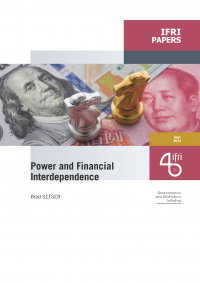
Power and Financial Interdependence Ifri Papers, May 2024
The link between financial self-reliance and geopolitical power has long been debated. The unbalanced Sino-American trade relationship has created asymmetric financial ties which generate potential sources of leverage for both parties and will not quickly disappear. Absent a clarifying major crisis, it will be difficult to definitively determine which party has greater leverage.

Many in the United States (US) are concerned about indebtedness to its primary strategic rival, and the risks posed by a sudden Chinese withdrawal from US financial markets. US policymakers actively sought to encourage China’s top leadership not to withdraw financing from the market for US Agency securities in the run-up to the global financial crisis.
Yet China also sees risks in this unbalanced financial relationship. Chinese policymakers have expressed concern about the domestic political consequences of losses on either their Treasury or Agency holdings and actively have sought to diversify China’s reserves – including by substituting the risk of lending to developing economies for the visibility associated with large holdings of Treasuries in US custodians. China increasingly worries that its dollar holdings and the dollar’s global role increase its vulnerability to potential financial sanctions.
Both parties thus worry about the possibility that financial interdependence can be weaponized yet find it hard to extricate themselves from the inevitability of financial interdependence absent a clean break from an entrenched pattern of trade imbalances.
This paper is also available in French: "Puissance et interdépendance financière" (pdf).


